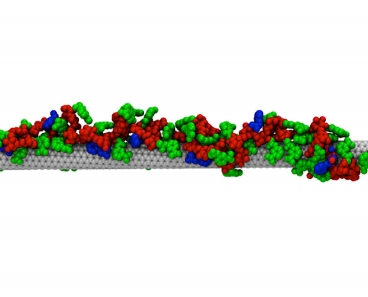Synthetic antibodies using carbon nanotubes
(MIT, November 24, 2013)
 MIT chemical engineers have developed a novel way to generate nanoparticles that can recognize specific molecules, opening up a new approach to building durable sensors for many different compounds, among other applications. To create these “synthetic antibodies,” the researchers used carbon nanotubes — hollow, nanometer-thick cylinders made of carbon that naturally fluoresce when exposed to laser light. In the past, researchers have exploited this phenomenon to create sensors by coating the nanotubes with molecules, such as natural antibodies, that bind to a particular target. When the target is encountered, the carbon nanotube’s fluorescence brightens or dims. The MIT team found that they could create novel sensors by coating the nanotubes with specifically designed amphiphilic polymers.
MIT chemical engineers have developed a novel way to generate nanoparticles that can recognize specific molecules, opening up a new approach to building durable sensors for many different compounds, among other applications. To create these “synthetic antibodies,” the researchers used carbon nanotubes — hollow, nanometer-thick cylinders made of carbon that naturally fluoresce when exposed to laser light. In the past, researchers have exploited this phenomenon to create sensors by coating the nanotubes with molecules, such as natural antibodies, that bind to a particular target. When the target is encountered, the carbon nanotube’s fluorescence brightens or dims. The MIT team found that they could create novel sensors by coating the nanotubes with specifically designed amphiphilic polymers.